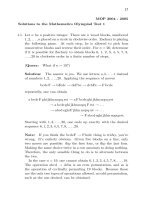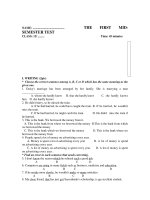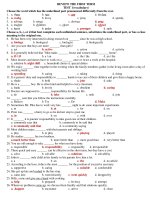- Trang chủ >>
- Mầm non - Tiểu học >>
- Lớp 1
trial test 1
Bạn đang xem bản rút gọn của tài liệu. Xem và tải ngay bản đầy đủ của tài liệu tại đây (1.28 MB, 12 trang )
<span class='text_page_counter'>(1)</span><div class='page_container' data-page=1>
<b>Part I: READING</b>
<b>A. Direction: You are going to read an article about making better use of time at work. Choose </b>
<b>the most suitable heading from the list A-H</b>
<b>for each part (1-6)</b>
<b>of the article. There is one extra </b>
<b>heading which you do not need to use. There is an example at the beginning (0).</b>
<i> </i>A<i> </i>Inability to let others help
<i> </i>B<i> </i>Those in charge aware of problem
C Failure to take responsibility
D Employers and workers need to change
E Feeling there is too much to do
F Bad effects at home and at work
G Lacking a clear system
H Time spent working
<b>MAKING BETTER USE OF TIME AT WORK</b>
0 H
A recent survey by Austin Knight reveals that in British industry the 'long hours culture' is the new
British disease. In their report of over 22 well-known British companies representing over one million
workers, they found that British office workers have some of the longest hours in Europe, if not <i><b>the</b></i>
longest.
1
They found that two out of three work 40 hours or more per week, 25 per cent work 50 hours or more.
In addition, 76 per cent of these workers say that continually working long hours affects their physical
health, 47 per cent say their families suffer and 45 per cent feel their work performance is undermined.
2
Oddly enough, 90 per cent of employers also see long hours as a problem because of reduced
performance and lowered morale<b>.</b>
3
So, what can be done? Obviously one important step is that employers understand the potentially
negative effects of long working hours on their employees' health, family and performance. However,
there are strategies that individuals can engage in that will help them manage their time better.
</div>
<span class='text_page_counter'>(2)</span><div class='page_container' data-page=2>
There seem to be at least three different types of time wasters. First there is the 'mahana' type who
feels that you should not 'do today what you can do tomorrow'. These are the procrastinators who see
the job as 'too big' for them to handle. Some basic tips for these people are (1) to break up huge tasks
into smaller jobs, (2) to draw up a list of things to do, with the most important tasks at the top and the
least important at the bottom, (3) to balance routine tasks with more enjoyable ones and (4) to deal with
each document that comes their way once only (read it, act upon it, file it or throw it away).
5
<b> </b>Second, there are the 'poor delegators', the people who feel that nobody can do a job as well as they
can. They either want to retain the power or just feel it is part of the job, and feel that by not doing it,
they are not fulfilling their responsibilities. The basic tips for these types are: (1) to accept that
delegation does not mean giving up responsibility, (2) having delegated a job, to leave the person to get
on with it, and (3) say 'no' politely to work that is outside their area of responsibility.
6
<b> </b>
Finally, there is the disorganised type who is instantly recognised by piles of paper around his or her
desk. These individuals miss or are late for appointments, forget or misplace papers and are frequently
involved in trying to find lost telephone numbers, diary dates, and people's names. They need to do
some of the following: (1) stick to one task and finish it, (2) buy a large note pad for writing down all
notes, messages, etc., (3) clear the top of their desk and have only the task they are dealing with in front
of them, (4) spend time setting up systems to gain control of the chaos.
<b>B. Direction: You are going to read an article about soap operas. For the questions which follow, </b>
<b>choose the answer (A, B, C, or D) which you think fits best according to the text.</b>
In the 1930s, when radio was still in its infancy, broadcasting stations in the USA wondered what type
of programmes they should put on during the daytime. They came up with the idea of producing serials
that would be on the radio every afternoon telling a continuous story. To keep the listeners' interest,
there would be far more crises occurring than in real life. Knowing that the majority of the audience
would be women, the broadcasters decided that the women in the serials would be strong characters
and the men weak. The serials were an instant success with listeners. As the radio stations were paid for
by advertising, these programmes always carried advertisements and, since one of the most frequently
advertised products was soap, the programmes became known as Soaps or Soap Operas.
It was really by chance that the soap opera appeared in Britain. The BBC (British Broadcasting
Corporation) had no interest in producing this type of programme but during the Second World War it
was thought that the Americans should be shown how well the British people were standing up to the
war. For this reason, a soap opera was written for the North American service of the BBC; it was called
Front Line Family and showed how a typical English family, the Robinsons, were living during the
war. Some people in Britain managed to hear the programme and asked for it to be broadcast for the
British audience. The BBC were unwilling to do this but finally agreed and broadcast the programme in
Britain, but changed the name to The Robinsons. The programme ran for six years.
Other soaps were introduced later, one telling the life of a doctor's family and another, The Archers,
about life in a country village. The original aim of The Archers was to inform farmers of new
developments in agriculture. The serial began in 1951 and is still to be heard on five evenings every
week.
</div>
<span class='text_page_counter'>(3)</span><div class='page_container' data-page=3>
street near Manchester. Although the serial was planned to run for only thirteen weeks, it is still to be
seen several nights every week and almost every week has more viewers than any other programme on
British television.
The BBC never managed to produce a really successful soap opera until 1984, when it introduced
Eastenders. This programme is about life in an area of the east end of London. For a time it had more
viewers than Coronation Street and still rivals it as the most popular programme on British television.
There is a major difference between the two programmes in that Eastenders concentrates on often
rather depressing realism whilst Coronation Street, although having serious storylines, always contains
a strong element of comedy.
1. <b>What problem did broadcasting stations in America have in the early days of radio?</b>
A<i> </i>how to reflect real life
B<i> </i>what to broadcast during the day
<i>C </i>what type of serial to produce
D how to entertain women
2. <b>Why did the radio stations make women have the strongest characters in soap operas?</b>
A<i> </i>Because men usually have weak characters.
B Because no men would be listening.
C Because women deal better with crises.
D Because the audience would be mainly female.
<i>3. </i><b>Why was the name soap or soap opera given to these programmes?</b>
A<i> </i>Soap was often advertised during the programmes.
B<i> </i>Soap companies advertised the programmes.
C<i> </i>Soap companies owned several radio stations.
DSoap was the only product advertised during the programmes.
<i>4. </i><b>Why was the programme Front Line Family made?</b>
A<i> </i>to tell the Americans why the British were at war
B to tell the Americans how the British were living during the war
C<i> </i>to tell the Americans how the British were winning the war
D<i> </i>to tell the Americans why the British stood to win the war
<i>5. </i><b>Why did the BBC begin to broadcast Front Line Family in Britain?</b>
A<i> </i>Because people in America liked it.
B<i> </i>Because the BBC thought it would run for six years.
C<i> </i>Because people asked to hear it.
D<i> </i>Because the BBC changed its name.
6. <b>What do we learn about The Archers in this passage?</b>
<i> </i>AThe programme was about a country doctor.
<i> </i>B<i> </i>It could be heard every evening of the week.
<i> </i>C<i> </i>It was first broadcast before 1951.
<i> </i>DThe aim of the programme was to educate farmers.
<i> 7. </i><b>What do we learn about Coronation Street?</b>
</div>
<span class='text_page_counter'>(4)</span><div class='page_container' data-page=4>
<i> </i>BIt has lasted longer than expected.
<i> </i>CIt was the first real soap on to be shown on BBC television.
<i> </i>DIt takes place in central Manchester.
8. <b>How is Coronation Street different from Eastenders?</b>
<i> </i>A<i> </i>It is funnier.
<i> </i>B <i> </i>It has a stronger storyline.
<i> </i>C<i> </i>It is more serious.
<i> </i>D<i> </i>It is more like real life.
</div>
<span class='text_page_counter'>(5)</span><div class='page_container' data-page=5></div>
<span class='text_page_counter'>(6)</span><div class='page_container' data-page=6></div>
<span class='text_page_counter'>(7)</span><div class='page_container' data-page=7></div>
<span class='text_page_counter'>(8)</span><div class='page_container' data-page=8></div>
<span class='text_page_counter'>(9)</span><div class='page_container' data-page=9></div>
<span class='text_page_counter'>(10)</span><div class='page_container' data-page=10></div>
<span class='text_page_counter'>(11)</span><div class='page_container' data-page=11></div>
<span class='text_page_counter'>(12)</span><div class='page_container' data-page=12></div>
<!--links-->









